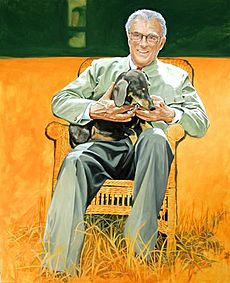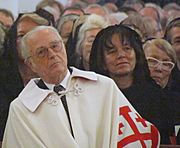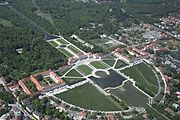Franz von Bayern facts for kids
Quick facts for kids Franz von Bayern |
|
|---|---|
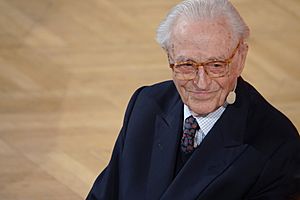
Franz in 2023
|
|
| Head of the House of Wittelsbach | |
| Tenure | 8 July 1996 – present |
| Predecessor | Albrecht |
| Heir presumptive | Max Emanuel |
| Born | Franz Bonaventura Adalbert Maria Prinz von Bayern 14 July 1933 Munich, Germany |
| House | Wittelsbach |
| Father | Albrecht, Duke of Bavaria |
| Mother | Countess Maria Draskovich of Trakostjan |
| Religion | Catholicism |
Franz Bonaventura Adalbert Maria Herzog von Bayern (born 14 July 1933) is known as the Duke of Bavaria. He is the current head of the House of Wittelsbach. This was once the ruling family of the Kingdom of Bavaria. His great-grandfather, King Ludwig III, was the last king of Bavaria. He was removed from power in 1918.
Franz was born in Munich, Germany. During World War II, his family was against the Nazis. They first moved to Hungary. However, they were arrested in 1944. Franz was only 11 years old then. He was held in several Nazi concentration camps, including Sachsenhausen and Dachau.
After the war, Franz studied at the University of Munich. He became a big collector of modern art. In 1996, his father passed away. Franz then became the head of the House of Wittelsbach. He also became the person who would claim the Bavarian throne if it still existed. Today, he lives at Nymphenburg Palace in Munich and Berg Palace.
Franz is also in line for the thrones of England, Scotland, and Ireland. This is part of the Jacobite succession. However, he does not try to claim these thrones.
Contents
Early Life and Challenges
Franz was born on 14 July 1933 in Munich. He was the third child and first son of Albrecht, Duke of Bavaria. His mother was Countess Maria Draskovich of Trakostjan. Her family was a noble family from Croatia. At first, his parents' marriage was not fully accepted by the royal family. This was because his mother's family was not a former ruling family. But in 1949, when Franz was 15, his grandfather accepted the marriage. This meant Franz could become the head of the family.
Family Against the Nazis
The Wittelsbach family did not support the Nazi government in Germany. Franz's grandfather, Crown Prince Rupprecht, had already shown he was against Adolf Hitler in 1923. In 1933, after Hitler came to power, Franz's father, Albrecht, sent a letter to the president. The letter protested against the Nazis taking control of the German states.
In July 1934, Prince Albrecht and his family moved to Hungary. They returned to Bavaria for a few years, living quietly. But in 1939, they moved back to Budapest, Hungary. The children had private lessons because the local German school was controlled by Nazi supporters.
Arrest and Captivity
In March 1944, Nazi Germany took over Hungary. On 6 October 1944, the entire family was arrested by the Gestapo. This included 11-year-old Franz. They were sent to several Nazi concentration camps. These included Oranienburg, Flossenbürg, and Dachau.
As special prisoners, they were kept together in separate buildings. Franz remembers they received only one slice of bread a day, which was often moldy. The family suffered greatly from hunger and sickness. They barely survived. In April 1945, the United States Third Army freed them.
Education After the War
After the war, Franz went to school at the Benedictine Abbey of Ettal. He then studied business at the University of Munich and in Zürich. In the 1950s, he joined his father and sister on special ship tours. These tours were called the "Cruise of the Kings" and included many royal family members from Europe.
Supporting Modern Art
Franz became very interested in modern art. He started collecting art from German artists. He loaned his important art collection to the Pinakothek der Moderne in Munich. This museum displays modern art. He had worked for many years to help create this museum. He also loaned art to the Munich State Graphic Collection.
He is the chairman of the group that supports the Alte Pinakothek museum. He also helped start the Munich Gallery Association. Franz is an honorary president of the Friends of the Egyptian Collection Munich. In 2009, he gave his large private library of 20th and 21st-century art books to the Central Institute for Art History in Munich.
Franz has strong connections in the New York City art world. He was the first German person to be chosen for the International Council of the Museum of Modern Art. He later became the chairman of this council for 16 years. He worked closely with the museum's president to grow its collection. Even though he was friends with famous American artists like Andy Warhol, he mostly collected German art. He once said, "American art was always one step ahead of my financial possibilities."
In 2003, he received the Duncan Phillips Award. This award is given to people who support museums. Franz was the first European to receive it.
Other Important Roles
The head of the House of Wittelsbach has many responsibilities. Franz leads the Wittelsbach Compensation Fund. This fund manages many family possessions. These include art treasures and collections, which are now mostly in Munich museums like the Alte Pinakothek and Neue Pinakothek. It also includes former royal palaces like Berg and Hohenschwangau.
The Wittelsbach family receives about 14 million Euros each year from this fund. Franz decides how this money is used.
As the head of his family, Franz is also the Grand Master of several special family orders. These include the Order of Saint George and the Order of St. Hubert. He is also president of the Bavarian groups for the Knights' Order of the Holy Sepulchre and the Sovereign Military Order of Malta.
Franz is interested in science as well as art. He has supported the growth of research in Bavaria. He was a member of the board for several universities and museums, like the Deutsches Museum. He also leads many other groups, such as the Bavarian Sports Shooting Association.
Connecting with Faiths
The Wittelsbach family has a long history with the Roman Catholic Church. Franz has worked for many years with the Catholic Academy in Bavaria. He has also built relationships with the Evangelical Lutheran Church in Bavaria and Jewish communities. In 2007, he helped start the Nymphenburg Talks. This group brings together people from different cultures and religions, including Muslims, to talk and understand each other.
Franz continues a family tradition of hosting a large annual dinner at Nymphenburg Palace. He lives in a part of this palace. About 1,500 guests attend, including people from politics, churches, science, and art. He also invites smaller groups to Berchtesgaden Palace to discuss important topics.
In 2013, Franz celebrated his 80th birthday at the Schleissheim Palace near Munich. About 2,500 guests attended, including the head of the Bavarian government at the time.
Family and Future Leadership
The person who will become the next head of the House of Wittelsbach after Franz is his brother, Max Emanuel Herzog in Bayern. Max has five daughters but no sons. Because of this, the next in line after Max is their cousin, Prince Luitpold. After Prince Luitpold, it would be his son, Prince Ludwig of Bavaria (born 1982).
Franz is also a descendant of the House of Stuart. This means that if certain old laws were still in place, Franz would be the person to inherit the crowns of England, Scotland, and Ireland. This is part of the Jacobite succession. However, Franz has said that this is just a "historical curiosity" and not something he is trying to achieve. He sees it as "an entirely British question" that does not concern him.
Titles and Honours
Titles and Styles
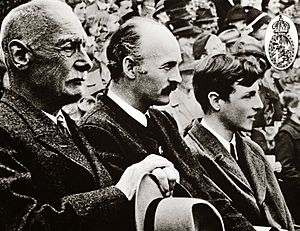
Franz is traditionally called His Royal Highness the Duke of Bavaria. He is also known as the Duke of Franconia and in Swabia, and Count Palatine of the Rhine.
When he was born, Franz was called Prinz von Bayern (Prince of Bavaria). In 1996, after his father passed away, he changed his title to Herzog von Bayern (Duke of Bavaria).
Honours and Awards
 Germany: Commander's cross of the Order of Merit of the Federal Republic of Germany
Germany: Commander's cross of the Order of Merit of the Federal Republic of Germany Holy See: Knight Grand Cross with Collar of the Order of the Holy Sepulchre
Holy See: Knight Grand Cross with Collar of the Order of the Holy Sepulchre Sovereign Military Order of Malta: Protector Bailiff Knight Grand Cross of Obedience of the Sovereign Military Order of Malta, 1st Class
Sovereign Military Order of Malta: Protector Bailiff Knight Grand Cross of Obedience of the Sovereign Military Order of Malta, 1st Class Sovereign Military Order of Malta: Knight Grand Cross of the Order of Merit
Sovereign Military Order of Malta: Knight Grand Cross of the Order of Merit Romania: Knight Grand Cross of the National Order of Merit
Romania: Knight Grand Cross of the National Order of Merit House of Habsburg-Lorraine: Knight of the Order of the Golden Fleece, 1960
House of Habsburg-Lorraine: Knight of the Order of the Golden Fleece, 1960
See also
- Monarchism in Bavaria after 1918
- Jacobite succession
 | Jewel Prestage |
 | Ella Baker |
 | Fannie Lou Hamer |


